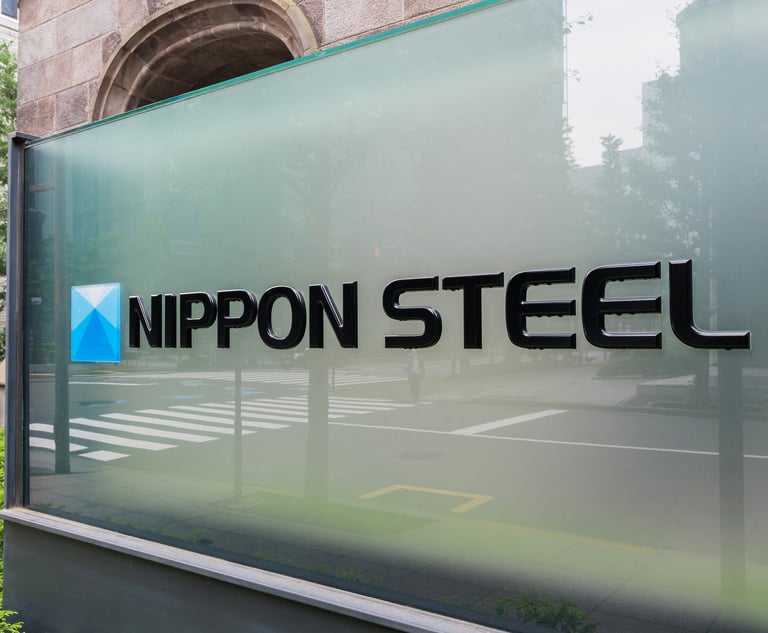Superior Court: IVC Filter Cases Against French Manufacturer Should Stay in Pa.
A unanimous three-judge panel of the Pennsylvania Superior Court ruled this week that a Philadelphia trial judge failed to take into account Pennsylvania's interest in the litigation.
October 18, 2019 at 12:06 PM
5 minute read
 (Photo: Shutterstock.com)
(Photo: Shutterstock.com)
A state appeals panel has brought back to Pennsylvania several lawsuits against a French medical device-maker over allegedly defective blood filters, reversing a trial judge's determination that Pennsylvania would be an inconvenient forum.
A unanimous three-judge panel of the Pennsylvania Superior Court ruled this week that a Philadelphia trial judge failed to take into account Pennsylvania's interest in the litigation and should not have granted defendants' forum non conveniens motion. The case is one of more than 750 pending in the Philadelphia Court of Common Pleas' mass tort program over allegedly defective inferior vena cava filters.
The Superior Court's decision came in the case McConnell v. B. Braun Medical.
The lower court's ruling had dismissed the case and granted the defendants' request to have the case heard in either plaintiff Beonca McConnell's home state of Texas, or Michigan, where her IVC filter was implanted.
However, according to Superior Court Judge Dan Pellegrini, who wrote the panel's 20-page opinion, the lower court improperly weighed much of the evidence, including affidavits from three defense witnesses stating they lived in Lehigh County, where B. Braun Interventional Systems Inc. has its North American principal place of business.
"The Braun defendants argued that Philadelphia County would be so inconvenient for these employees that the trial should be transferred to Lehigh County," Pellegrini said in a footnote. "The logical conclusion of that claim is that if a trial in Philadelphia County would be highly disruptive to the lives of those potential witnesses, then a trial in Texas or Michigan would be even more so."
On Thursday, the Superior Court applied McConnell to three similar IVC filter lawsuits against the same defendants. Those three other suits had been similarly dismissed, with provisions for the plaintiffs to file their cases in states including New York and Washington.
Although Wednesday's ruling kept the lawsuits in Pennsylvania, it did not address the issue of whether the cases should be transferred to Lehigh County.
Willow Grove, Pennsylvania, attorney Howard Bashman argued the cases for the plaintiffs on appeal. The Law Offices of Ben Martin in Dallas and attorneys from Sheller P.C. in Philadelphia are trial counsel for the plaintiffs.
Bashman noted that, with two defendants based in Pennsylvania, there was no doubt about Pennsylvania's jurisdiction, and that the defendants' warnings about flooding the local court system with these cases were unfounded.
"I think the opinion is certainly making a good point when it notes that Philadelphia Common Pleas does have this mass torts center that exists to handle cases of this nature, and it does a good job of doing so," Bashman said.
Bashman added that, given the proximity of Lehigh County to Philadelphia, it is unlikely the cases will be sent less than 65 miles to the civil courthouse in Allentown.
"There's kind of this radius that you look at and it needs to be greater than the distance between Philadelphia and Lehigh County to be deemed inconvenient enough," Bashman said.
Gregory Sturges of Greenberg Traurig is representing Braun. He did not return a call seeking comment.
McConnell's case is one of hundreds of cases in Pennsylvania—and thousands across the country—alleging that the defendants failed to properly warn about the dangers of the filter devices, which were designed to prevent blood clots, but can allegedly migrate or fracture in patients' bodies, causing perforations. The injuries, according to plaintiffs, put patients at risk for a host of medical problems, including gastrointestinal difficulties, kidney failure and death.
The bulk of the litigation in Pennsylvania focuses on products made by Conshohocken, Pennsylvania-based Rex Medical and Argon Medical Devices, which is based in Plano, Texas.
The litigation in McConnell is over the VenaTech LP Vena Cava Filter. One of the defendants in case, B. Braun France, is a French company, and the company alleged the filters were designed and manufactured in France.
However, according to Pellegrini, the Braun defendants did not argue that the cases needed to be heard in a European court and instead focused on the convenience of Philadelphia. Pellegrini, who was joined by Judges Mary Murray and Eugene Strassburger, found that fact further supported keeping the litigation in Pennsylvania.
"This means that any domestic venue—whether in Pennsylvania, Texas or Michigan—would be equally remote from evidence of a design and manufacturing defect," Pellegrini said. "While the Braun defendants argue that Philadelphia county will be overburdened by numerous other VenaTech filter cases, it appears that litigating all the claims in one place, near their corporate offices, would be much more convenient than litigating those cases in countless jurisdictions simultaneously."
This content has been archived. It is available through our partners, LexisNexis® and Bloomberg Law.
To view this content, please continue to their sites.
Not a Lexis Subscriber?
Subscribe Now
Not a Bloomberg Law Subscriber?
Subscribe Now
NOT FOR REPRINT
© 2025 ALM Global, LLC, All Rights Reserved. Request academic re-use from www.copyright.com. All other uses, submit a request to [email protected]. For more information visit Asset & Logo Licensing.
You Might Like
View All
Pittsburgh's Reed Smith, K&L Gates Join Fight to Save Nippon Steel-U.S. Steel Merger

Kraft Heinz Hires GC of Industrial Manufacturer as Legal Chief

Mastercard CLO Exits After Just 14 Months, Takes Legal Reins of Laser Manufacturer
3 minute read
Black Worker Who Allegedly Faced Racist Harassment At Manufacturing Job Sues Employer, Staffing Company
Trending Stories
- 1How ‘Bilateral Tapping’ Can Help with Stress and Anxiety
- 2How Law Firms Can Make Business Services a Performance Champion
- 3'Digital Mindset': Hogan Lovells' New Global Managing Partner for Digitalization
- 4Silk Road Founder Ross Ulbricht Has New York Sentence Pardoned by Trump
- 5Settlement Allows Spouses of U.S. Citizens to Reopen Removal Proceedings
Who Got The Work
J. Brugh Lower of Gibbons has entered an appearance for industrial equipment supplier Devco Corporation in a pending trademark infringement lawsuit. The suit, accusing the defendant of selling knock-off Graco products, was filed Dec. 18 in New Jersey District Court by Rivkin Radler on behalf of Graco Inc. and Graco Minnesota. The case, assigned to U.S. District Judge Zahid N. Quraishi, is 3:24-cv-11294, Graco Inc. et al v. Devco Corporation.
Who Got The Work
Rebecca Maller-Stein and Kent A. Yalowitz of Arnold & Porter Kaye Scholer have entered their appearances for Hanaco Venture Capital and its executives, Lior Prosor and David Frankel, in a pending securities lawsuit. The action, filed on Dec. 24 in New York Southern District Court by Zell, Aron & Co. on behalf of Goldeneye Advisors, accuses the defendants of negligently and fraudulently managing the plaintiff's $1 million investment. The case, assigned to U.S. District Judge Vernon S. Broderick, is 1:24-cv-09918, Goldeneye Advisors, LLC v. Hanaco Venture Capital, Ltd. et al.
Who Got The Work
Attorneys from A&O Shearman has stepped in as defense counsel for Toronto-Dominion Bank and other defendants in a pending securities class action. The suit, filed Dec. 11 in New York Southern District Court by Bleichmar Fonti & Auld, accuses the defendants of concealing the bank's 'pervasive' deficiencies in regards to its compliance with the Bank Secrecy Act and the quality of its anti-money laundering controls. The case, assigned to U.S. District Judge Arun Subramanian, is 1:24-cv-09445, Gonzalez v. The Toronto-Dominion Bank et al.
Who Got The Work
Crown Castle International, a Pennsylvania company providing shared communications infrastructure, has turned to Luke D. Wolf of Gordon Rees Scully Mansukhani to fend off a pending breach-of-contract lawsuit. The court action, filed Nov. 25 in Michigan Eastern District Court by Hooper Hathaway PC on behalf of The Town Residences LLC, accuses Crown Castle of failing to transfer approximately $30,000 in utility payments from T-Mobile in breach of a roof-top lease and assignment agreement. The case, assigned to U.S. District Judge Susan K. Declercq, is 2:24-cv-13131, The Town Residences LLC v. T-Mobile US, Inc. et al.
Who Got The Work
Wilfred P. Coronato and Daniel M. Schwartz of McCarter & English have stepped in as defense counsel to Electrolux Home Products Inc. in a pending product liability lawsuit. The court action, filed Nov. 26 in New York Eastern District Court by Poulos Lopiccolo PC and Nagel Rice LLP on behalf of David Stern, alleges that the defendant's refrigerators’ drawers and shelving repeatedly break and fall apart within months after purchase. The case, assigned to U.S. District Judge Joan M. Azrack, is 2:24-cv-08204, Stern v. Electrolux Home Products, Inc.
Featured Firms
Law Offices of Gary Martin Hays & Associates, P.C.
(470) 294-1674
Law Offices of Mark E. Salomone
(857) 444-6468
Smith & Hassler
(713) 739-1250





